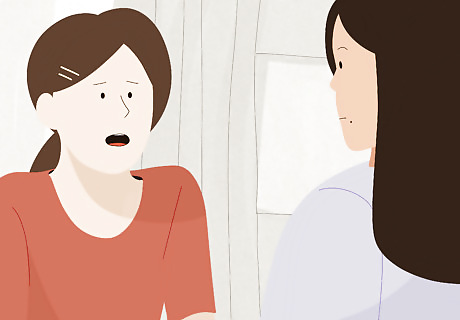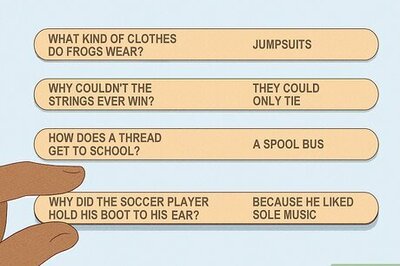
views
Putting Others First

Listen more. Instead of dominating a conversation by talking all the time, try to listen more to others’ opinions instead. Don’t just listen, but actively listen to what the person is saying. Focus on understanding the point that they are making, and take a few minutes to digest the information. While they're talking, listen, rather than formulating your answer. Then, provide an adequate response. For example, "So what you are saying is that by being a vegetarian you are also being environmentally conscious. That is a very interesting point. I never thought of it from that angle." Practice active listening by maintaining eye contact with the speaker, nodding occasionally, and asking clarifying questions once the speaker is done.

Give others credit. It is normal to want to feel good and give yourself credit for an accomplishment. However, chances are that you did not accomplish it all by yourself. There is always someone, like a friend, family member, mentor, or coworker, that helped you accomplish your goal by supporting your efforts. Take time to give your supporters the credit they deserve. For example, “I worked really hard to get into law school, but I could not have done it without the support of my friends and family. They were always there to cheer me up when my motivation was low.”

Consider other viewpoints. Always acknowledge other viewpoints in a positive manner. Defer judgment by allowing the speaker to finish what they are saying, and by not interrupting with counter-arguments. You gain or add nothing by attacking the speaker or by putting them down. When it is your time to respond, be honest, open, and candid in your response. For example, "That's an interesting point. However, others argue that dogs, especially pit bulls and German shepherds, are not inherently aggressive. Instead, it depends on their socialization and training. What do you think about that?"

Lend a helping hand. Instead of feeling better because you know how to do something better than someone else, feel better because you helped someone be better. By helping others, you will be able to make lasting friendships. For example, if a coworker struggles with their writing, offer to read and edit their writing, and provide insightful feedback.
Striving to Be Humble

Know your self-worth. Condescension usually comes from a place of insecurity and fear of rejection. However, by knowing your self-worth, you can feel more secure about yourself. When you feel more secure, you are less likely to put others down. Sit down and make a list of your strengths, weaknesses, accomplishments, and failures. By knowing these, you can assess your self-worth and find your inner confidence, as well as humility. For example, one of your strengths could be that you are highly motivated, while a weakness could be that you are quick to disregard opinions that are different from yours. If you need help, ask a friend or family member what traits they admire about you the most, as well as which traits they think you need to work on.

Avoid comparing yourself to other people. Condescension often develops out of envy, and the feeling that you can only feel better about yourself by feeling superior to others. Remember that your life experiences, strengths, and weaknesses are unique to you. Therefore, comparing yourself to other people is unproductive, since their experiences and circumstances are not the same as yours.

Put yourself in perspective. If you are good at something or have qualities that you take pride in (e.g. good looks, intelligence, or skill in a particular area), it is easy to fall into the trap of thinking that you are better than other people. This is called illusory superiority. Recognizing your sense of illusory superiority does not mean that you have to feel bad about yourself or minimize your own good qualities – just realize that many other people possess these qualities as well, and that they do not make you inherently superior to others.

Have an open mind. Try to realize that you do not know everything and that your opinion is just that, an opinion. Everyone is entitled to his or her own opinion, and you shouldn’t look down on someone just because their opinion is different. Instead, have an open mind. Look for similarities between you and others instead of differences. For example, if you have negative views about a religion or a culture, interview someone from that culture. Your intention should be to listen and learn instead of arguing or confirming your suspicions.

Monitor your words. Belittling others ruins your ability to work with and relate to others. It also creates a tense atmosphere where others feel inferior while you feel superior. By monitoring your words and actions, as well as others’ reactions, you can be more aware of condescending language, and its effects. Try to avoid condescending phrases, like, “Oh, you just figured that out,” “Let me see if I can put this in simple terms for you,” “We already thought of that,” or “What she is trying to say is that…” Instead, say things like, “Maybe I wasn’t clear enough,” “Are you saying that vegetarians are also environmentally conscious?” and “Yes, that is an interesting and valuable point. We are incorporating it.”
Regulating Your Body Language

Speak at a normal pace. Slowing your speech so others can “understand” you better makes the listener feel inferior since it is the way an adult speaks to a child. When you are explaining something to someone, don’t assume that they are the problem. It is more likely that you are not explaining it clearly or correctly. For example, don’t say, “I. will. be. studying. the. way. humans. interact. in. groups.” Instead, speak normally by saying, “I will be studying the way humans interact in groups. Let me explain what I mean by interact.”

Try to not refer to yourself in the third person. Referring to yourself in third person gives you an air of superiority. It is something that you should avoid doing if you do not want seem condescending. For example, don’t say, “She won a prestigious award for her paper” if you are referring to yourself. Also, try not to emphasize the my’s and I’s in your speech, for example, “MY opinion, is that MY book is the better book.”

Level your head and chin. While conversing with others, always keep your head and chin level. If you point your chin up with your forehead back while looking down your nose, you will seem superior. This head position signals that you think you know more than the other person, and that your opinion is more important and valid. Also, try to avoid impatient body language, such as loud sighs, eye-rolling, constantly looking at your watch or your phone, drumming your fingers, and yawning.














Comments
0 comment